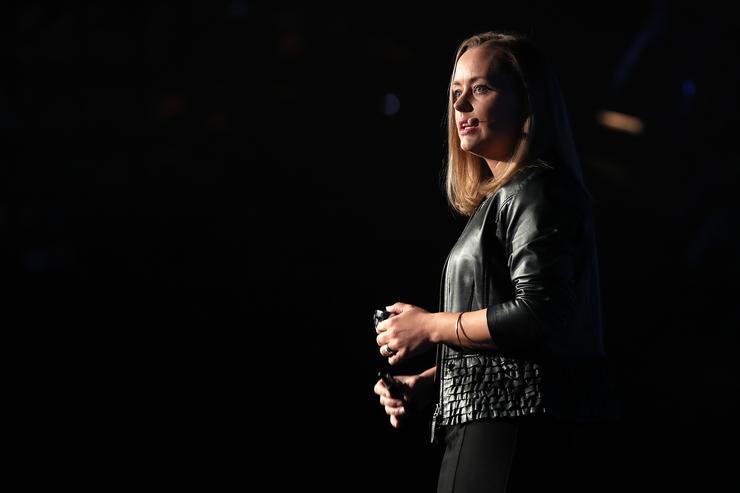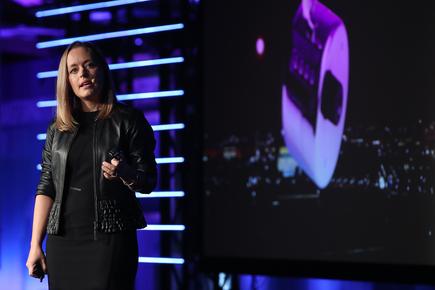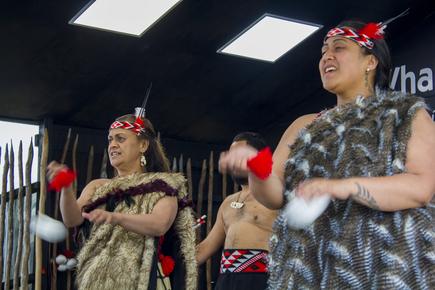
Focus on global domination in a niche market
A museum starts charging a mandatory admission fee, retaining a ‘pay-as-you-wish’ policy only for residents. Or it sells a building or a collection to raise funds.
When asked about challenges faced by museums worldwide, Angie Judge, chief executive at Dexibit is blunt: “This is an industry on its knees, dying for data to make it commercially sustainable.”
Auckland-based Dexibit provides analytics software to museums and other cultural institutions.
“These institutions are paying attention to every dime,” she says.
Museums had been happy with the status quo – with money coming in from government and donors, she says. “Change is coming in the way the people governed these institutions because of financial pressures.”
Lifting the industry back up
Museums need some strategic, long-term thinking on how to make sure the industry will continue to be here, says Judge, in her keynote at the first AWS Transformation Day in Auckland.
With the data they provide, museum executives are better armed to think strategically to provide users a superior experience from queue management to ensuring the visitors will have their favourite pies in the museum café, says Judge.
For instance, museums were reliant on big blockbuster exhibitions and it was anyone’s guess how these shows would be received by the public.
“We were sitting on all the data; we have visitor numbers, weather and cruise ships in town,” says Judge.
“If you can use this data for analysis, you can predict, using machine learning,” she says. “We deliver insights as much as possible, predicting performance so they can plan strategically, get operational gains, make sure cafes and shops are stocked.
“We ended up forecasting how many visitors will come to a venue, what they will shop at the museums. We are giving museums the insight on how they can beat the game,” says Judge.
Judge founded Dexibit in 2014, but as she points out, the company would not have grown to such a scale if it had been created 10 years ago. The rise of cloud computing models has helped Dexibit find a unique place in the world, says Judge.
“We were global from day one, with ‘number 8 wire’ thinking. If we started to build everything ourselves the first time around, we would have spent so much time and energy on that, rather than solving problems for our customers,” she says.
“It is only through the groundwork of the world’s transition to the cloud that made our business possible. The cloud provided that foundational layer for us to send up our own solution or scale up for a big customer or when we are entering into a new geographic market. We can concentrate on the real issues and go into new innovations like what we do with machine learning,” she says.
“This is how our little Kiwi data company became a global force.”

Startup to global
Judge shares a pragmatic lesson for other Kiwi technology entrepreneurs.
“When we started out, so many people told me we should be doing what we are doing in the retail sector,” Judge tells CIO New Zealand.
“That is a valid opinion and certainly, our technology will be useful in that industry.”
“And the reason for that is you always have a finite marketing spend and if you choose a really big ocean to play in, it becomes a drop. Whereas, if you choose a niche market to play in, you could make an impact.”
In the case of Dexibit, “we really wanted to change an industry and we wanted to choose a sector we could make a difference in,” says Judge.

We were global from day one, with ‘number 8 wire’ thinking
“As it happened, the museum industry from a macroeconomic perspective was in a position where it badly needed technology like this. The sector also happened to be underserviced in their technology,” she says.
Her advice to Kiwi tech companies who are going through a similar path is this: “Focus on global domination in a niche market.”
“Take a big market and get a small segment of it. It is more valuable when you are trying to build a technology company to have a global pie rather than just [become] another New Zealand ICT provider. I think that is where globally, our economy from a technology perspective has to play.”
She says in the case of Dexibit, the museums were their first niche. Eventually, they took on libraries, zoos and theme parks.
Judge believes her upbringing primed her to build a company like Dexibit.
Her father was a technology entrepreneur, while her mother was an arts fanatic. When she was young, her mother used to bring her to the Auckland Museum every week to watch the haka.

Judge sees the ways technologies are changing how cultural institutions engage with the public. For instance, museums are using AI in different ways. A bot can help viewers explore the collection over a Facebook chat. Physical robots talk to people, providing information about the collection, or where to find the bathrooms.
At the same time, she is thinking about ethics in AI, and stresses the importance of making sure what they are doing with data is transparent and for social good.
“How can we continue all of that and lead the way into the global industry? How do you establish trust and take that into the user experience?” she asks.
She says ethics is critical in the actual AI modelling itself and organisations do not need to know the personal identity of the visitors to make smart business decisions.
“There are terrible examples of what happens when you don't pay attention to AI ethics,” she says. “Wrong data makes judgmental decisions.”
‘Go do something magic with your data’ @angie_dexibit #AWSTransformationDay #startupto global #innovation #Analytics #museum pic.twitter.com/wRRhadTH9a
— Divina Paredes (@divinap) July 26, 2018
As to what is next for Dexibit, Judge says the company is working with aggregators like local governments.
“You have got a portfolio to benchmark and to forecast against from a city or country perspective. And, given we sit on a lot of data in terms of what is happening in the city, what the weather is doing, cruise ships [docking], pulling it together across the portfolio is fascinating.”
This is true in Auckland, with its museums, the Sky Tower and the sports stadiums, she adds.
“One of the coolest things is that analytics is going from company to company, to what is going on today, in an ecosystem.”
‘Focus on global innovation in a niche market’ @angie_dexibit #AWSTransformationDay @awscloud #cloud #analytics #techentrepreneur pic.twitter.com/0sGlNtgPvF
— Divina Paredes (@divinap) July 26, 2018

Get the latest on digital transformation: Sign up for CIO newsletters for regular updates on CIO news, career tips, views and events. Follow CIO New Zealand on Twitter:@cio_nz
Send news tips and comments to divina_paredes@idg.co.nz @divinap
Join the CIO New Zealand group on LinkedIn. The group is open to CIOs, IT Directors, COOs, CTOs and senior IT managers.
